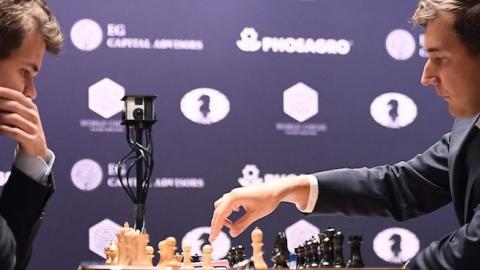With the election over, connoisseurs of Russian influence operations will want to redirect their attention to lower Manhattan, where the world chess championship is getting under way at the South Street Seaport.
The match, run by the World Chess Federation (FIDE), pits the Norwegian world champion Magnus Carlsen against his Russian challenger, Sergei Karjakin. It will consist of twelve games played over the next month. Carlsen, the overwhelming favorite, is a wunderkind, who became a grandmaster at age 13, and now at age 25 is no longer a kind but even more of a wunder, dominating the world chess scene in a way not witnessed since the retirement of former world champion Garry Kasparov. Karjakin—now 26—is also a prodigy, having become, at age 12, the youngest grandmaster ever. The two players have met each over the chess board in 21 previous encounters, with Carlsen winning won 4 times and losing only once—the other 16 games were draws.
From the point of view of the game of chess itself, this match is not expected to be of extraordinary interest. Karjakin, renowned for his remarkably subtle defensive abilities, arrived as the challenger through strong and consistent play in a series of qualifying tournaments. But in the ranking of the world's best chess players, determined by the highly accurate Elo rating system, he is not number two but only number nine.
The rating gap between Carlsen and Karjakin is a missed opportunity, because, among the players ranked higher than the Russian challenger are three Americans, which is a record number for the world's top ten list. Although the United States has been behaving like a declining power in world affairs, in the realm of chess we are in the midst of the greatest renaissance since Bobby Fischer walked the earth. If the world championship contenders were chosen by genius alone, Fabiano Caruana of Brooklyn, the world's number-two player, would occupy the challenger slot.
But we have Karjakin instead. Which brings us back to the somewhat bizarre politics of this world championship match. Karjakin is one of Putin's favored subjects. The genial young grandmaster is a fierce Russian nationalist. He welcomed the Kremlin's annexation of the Crimea. He has bashed human-rights campaigner and former world-chess champion Garry Kasparov for the political deviation he calls "ultra-radicalism." And he sports Putin t-shirts.
Karjakin's pro-Putin political orientation is closely linked to the even more bizarre politics of the world chess federation, FIDE. The head of FIDE, Kirsan Ilyumzhinov, is the former president of Kalmykia, a tiny "autonomous" republic inside the Russian federation, an office he won at age 33 on the platform of giving $100 and a mobile phone to every shepherd. Ilyuzhimov is an eccentric; among other things, he claims to have been abducted from his Moscow apartment by aliens and taken to their spaceship, and then to a star, before being returned to earth intact.
An extreme devotee of chess, Ilyuzhimov made instruction in chess mandatory in Kalmykia's elementary schools and founded Chess City on the outskirts of Elista, Kalmykia's capital, which features a Chess Museum and a Chess Palace. While chess aficionados can appreciate the virtue of extremism in pursuit of promoting the royal game, Ilyuzhimov also has his serious vices. He ruled Kalmykia like an oriental despotism, with an iron fist and by fostering an over-the-top cult of personality, and with ubiquitous posters of his visage visible across the landscape. He is a close ally of Vladimir Putin and enjoys the backing of all arms of the Kremlin, including the FSB. He was a pal of Muammar Qaddafi, with whom he liked to play an occasional game of chess. Perhaps most consequentially, he has been up to his eyeballs in oligarchic corruption.
It is that final fact which last November led the United States Treasury to sanction Ilyuzhimov, freezing his assets and banning him from traveling to the United States. The Treasury cited him for "materially assisting and acting for or on behalf of the Government of Syria [and the] Central Bank of Syria" in oil-related transactions that aided both the Syrian government of Bashar al-Assad as well as the Islamic State. The statement announcing the action cited the fact that an Ilyuzhimov adviser "was convicted in Russia in 1999 for the murder of an opposition journalist who reportedly was investigating an offshore business registration mechanism in Kalmykia tied to Ilyumzhinov."
In short, the head of the World Chess Federation is not a good guy. Also in short, although the chess match now getting under way in New York is FIDE's premier event, FIDE's president will not be in attendance. Ilyuzhimov is currently in Moscow, beseeching the U.S. embassy for a visa. He is unlikely to get one. But the organization he runs has established, at least for this month, a beachhead near the heart of Wall Street. Having wrapped up its meddling in the U.S. presidential election, the Kremlin is sedulously pressing forward in the chess world. Although Magnus Carlsen, representing the NATO ally of Norway, is heavily favored to win the contest, if Karjakin, like Trump, prevails in a Brexit-like surprise, the darkest suspicions will be aroused in many quarters.















